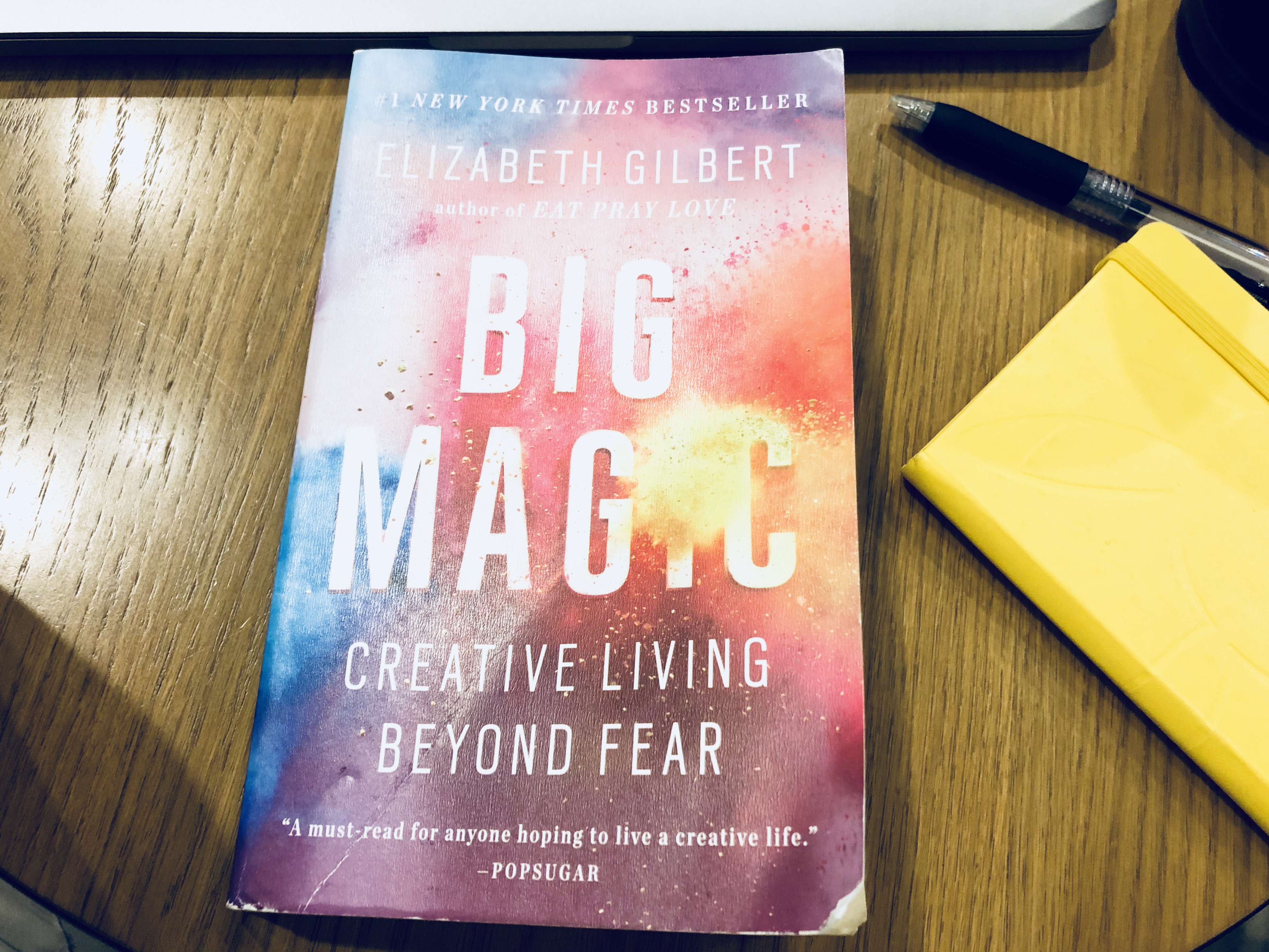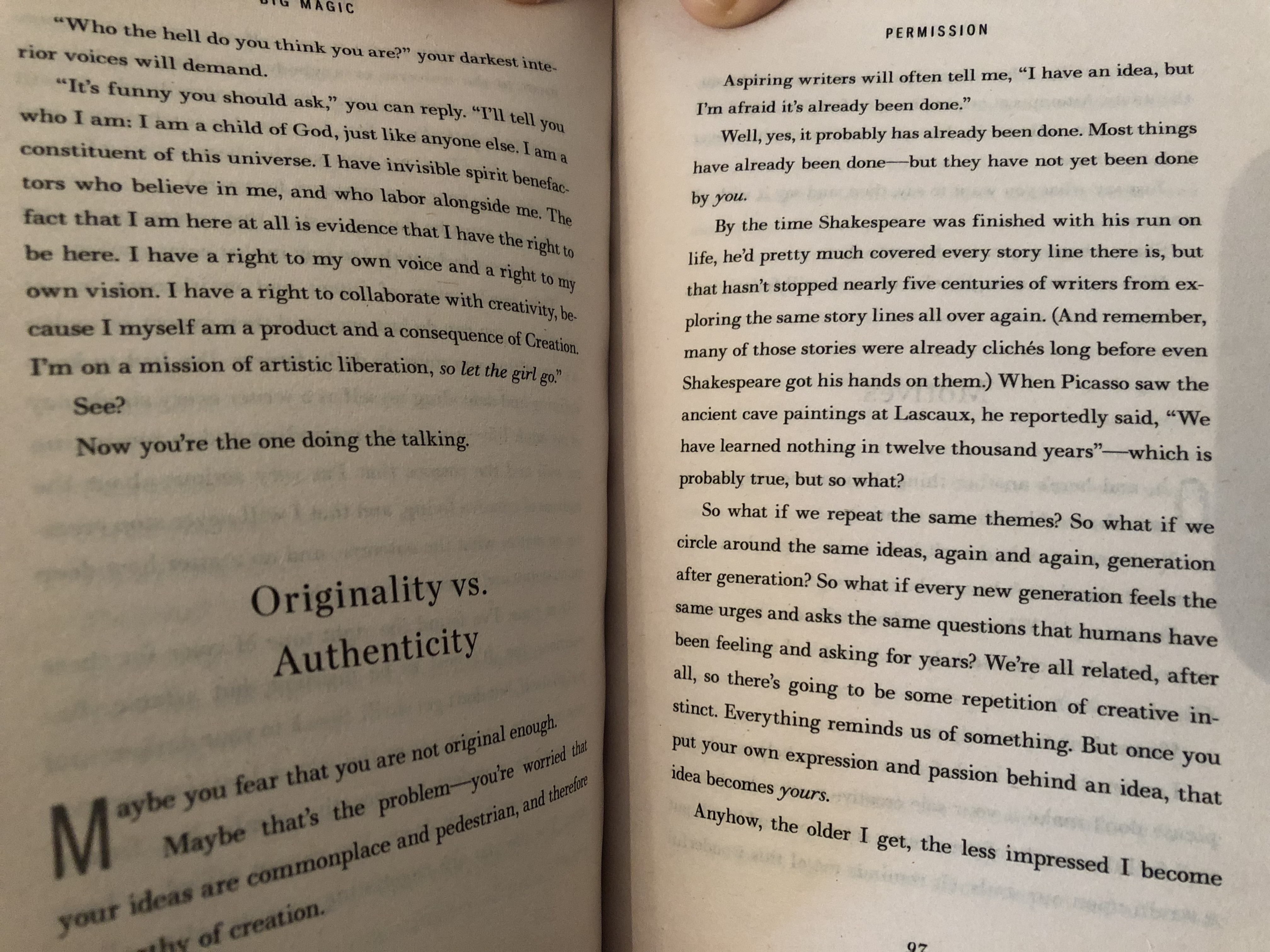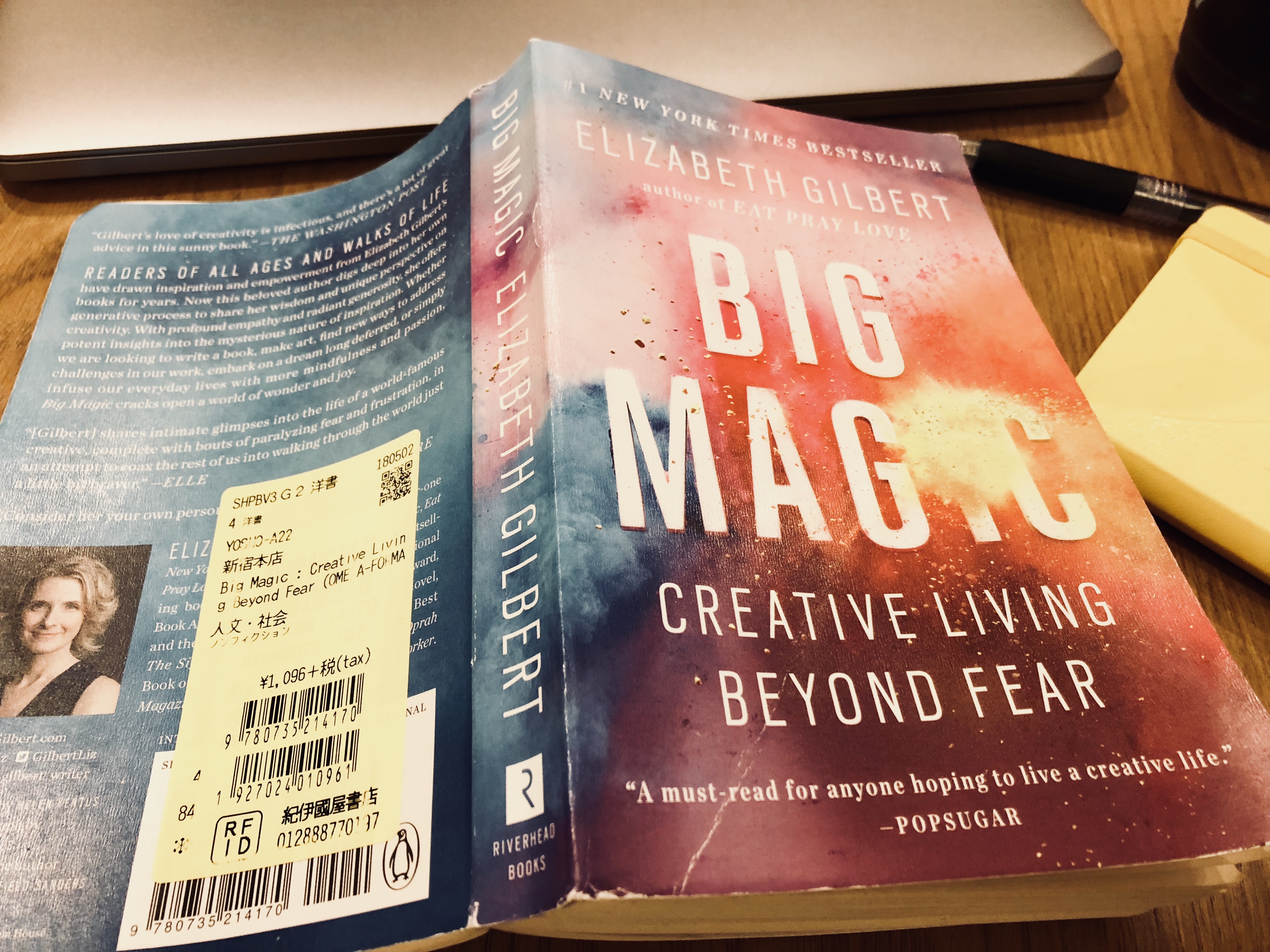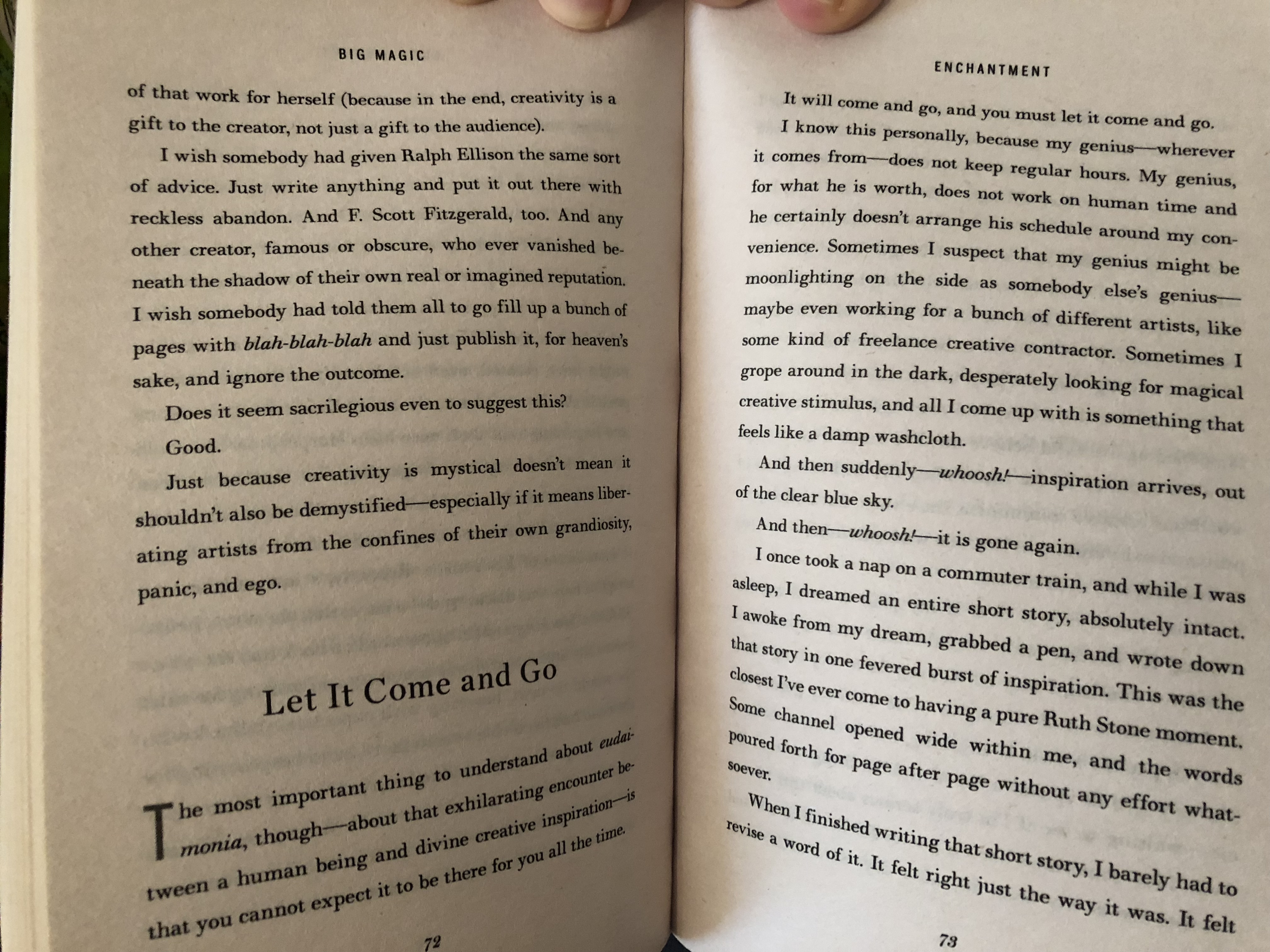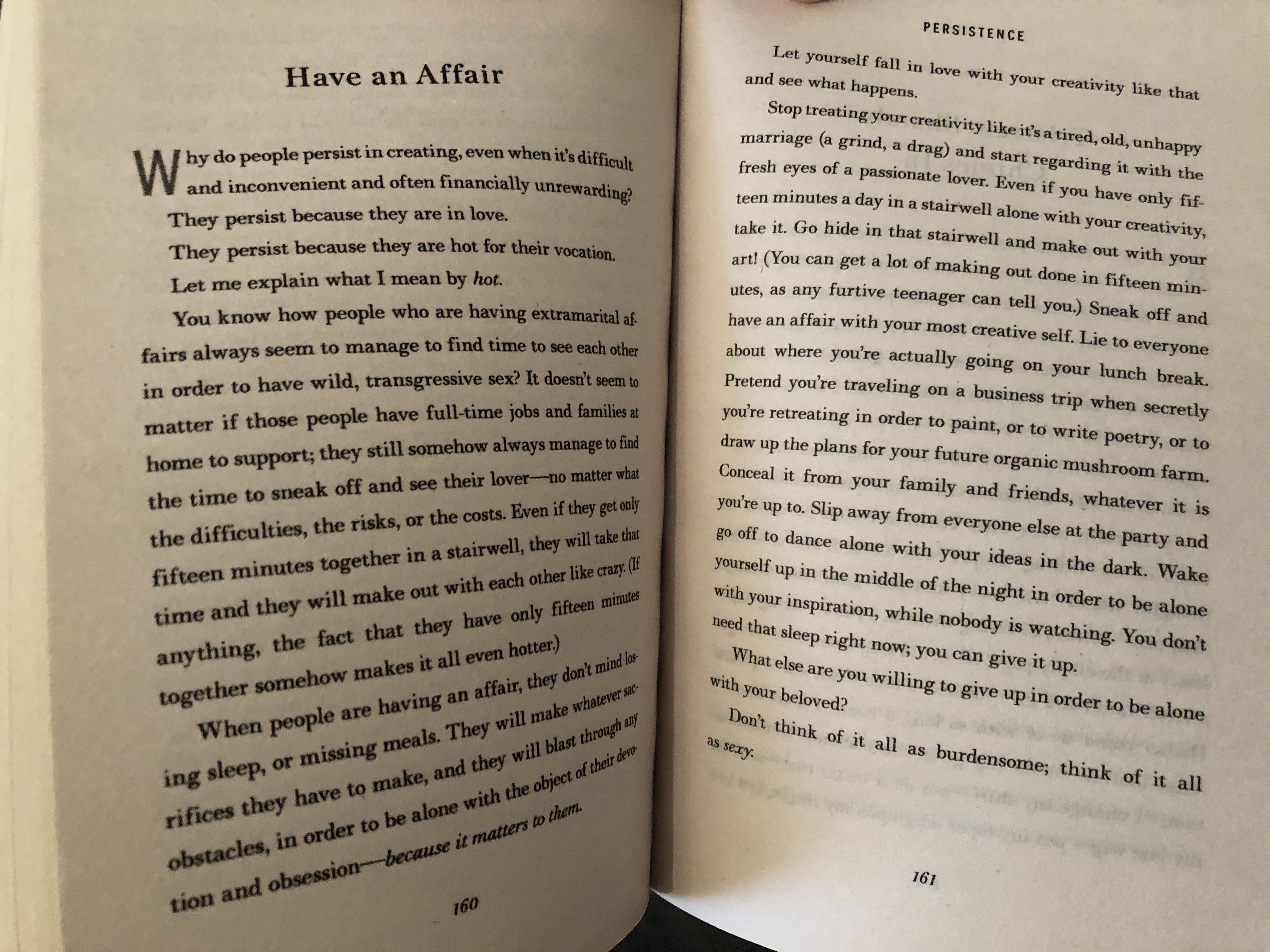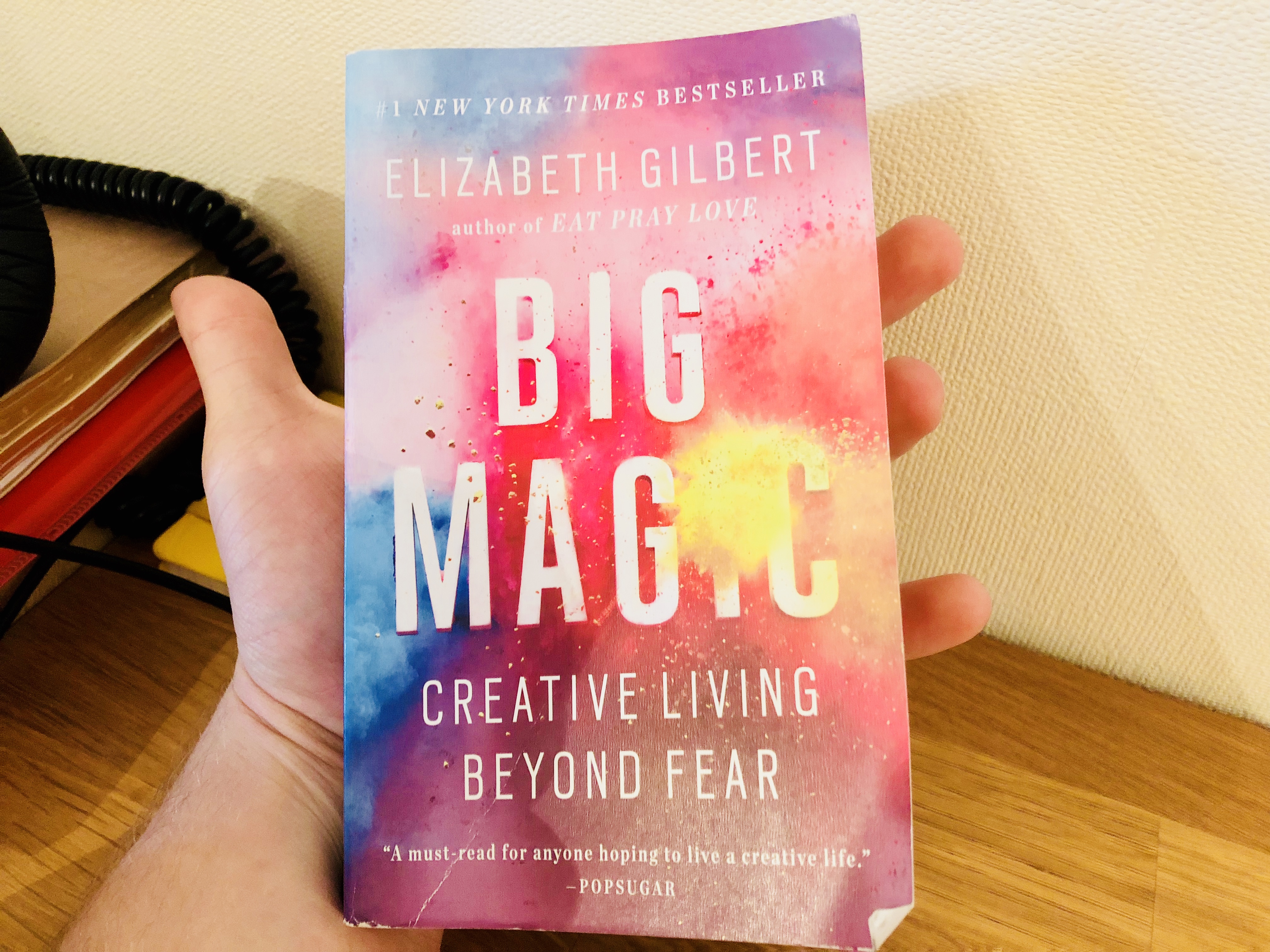I lost touch with my creativity this year. Then Elizabeth Gilbert’s Big Magic helped me get it back.
I’m not the Eat Pray Love type. But I’ll give any of Gilbert’s fiction a go now. That’s how impressed I was with Big Magic, how profoundly it moved me, and the impact it had on relighting a dying creative flame.
10 Lessons Learned from Big Magic by Elizabeth Gilbert (Review)
The lessons may not be new. But the passion and perspective from which Gilbert presents them is so genuine that you will experience them as though they are being born for the first time.
My review can’t do justice to reading the book itself, but let’s give it a go anyway.
1 – WHATS GOOD FOR YOU IS GOOD FOR YOUR ART
I never understood why so many of my creative heroes suffered so desperately in pursuit of their art.
I’ve always known that when I’m unhappy, I can’t create anything.
So it felt like I found a kindred spirit in Gilbert when she said the exact same thing. She needs to be happy and satisfied in the other areas of her life in order to write. Especially fiction.
In contemporary Western civilization, the most common creative contract still seems to be one of suffering. This is the contract that says, I shall destroy myself and everyone around me in an effort to bring forth my inspiration, and my martyrdom shall be the badge of my creative legitimacy.
The contract of the Tormented Artist includes:
- expressing constant dissatisfaction with your work
- arrogance when successful, self-pitying in failure
- competing jealously against your peers
- begrudging anyone else’s victories
- considering your talents a curse
- drinking as much as possible
- sabotaging all relationships
- dying young
But there’s a different way.
It doesn’t have to be like that.
You can lay off the booze a bit in order to have a keener mind. You can nourish healthier relationships in order to keep yourself undistracted by selfinvented emotional catastrophes. You can dare to be pleased sometimes with what you have created. […] You can support other people in their creative efforts, acknowledging the truth that there’s plenty of room for everyone. You can measure your worth by your dedication to your path, not by your successes or failures. […] You can live a long life, making and doing really cool things the entire time. You might earn a living with your pursuits or you might not, but you can recognize that this is not really the point. And at the end of your days, you can thank creativity for having blessed you with a charmed, interesting, passionate existence.
You can be a trickster instead of a martyr.
- Related reading: 11 Ways Writers Can Keep Fit
2 – YOU ARE NOT A GENIUS
Gilbert points out that around the Renaissance time, people stopped saying they “had genius” and started saying they “were genius”.
This was a complete disservice to the artist.
When burdened with the label of “genius”, artists can no longer approach their work with the lightness required to create.
Consider Harper Lee, for instance, who wrote nothing for decades after the phenomenonal success of To Kill a Mockingbird. In 1962, when Lee was asked how she felt about the possibility of ever writing another book, she replied, “I’m scared.” She also said, “When you’re at the top, there’s only one way to go.”
But is reaching a “top” really the only motive to create?
What do ideas of winning and losing, reputation, and commerce have to do with creativity?
What does any of that have to do with the pursuit of love? What does any of that have to do with the strange communion between the human and the magical? What does any of that have to do with faith? What does any of that have to do with the quiet glory of merely making things, and then sharing those things with an open heart and no expectations?
Gilbert talks about how she wishes Harper Lee had kept writing after winning the Pulitzer for To Kill a Mockingbird. She wishes Lee “had churned out five cheap and easy books in a row—a light romance, a police procedural, a children’s story, a cookbook, some kind of pulpy action-adventure story, anything.”
Imagine what she might have created, even accidentally, with such an approach. At the very least, she could have tricked everyone into forgetting that she’d once been Harper Lee. She could have tricked herself into forgetting that she’d once been Harper Lee, which might have been artistically liberating.
3 – YOU DON’T NEED PERMISSION TO BE CREATIVE
This is advice you hear a lot in creative self-help circles.
I always thought it was kinda stupid advice because it’s obvious.
Who really thinks they need permission to be creative?
But then I realised I did…
My need for permission to be creative takes the form of guilt whenever I sit down to write fiction.
I always feel guilty about doing something that isn’t worthwhile.
But who says it’s not worthwhile? Where does this feeling come from?
This is a self-imposed shackle.
Society reveres creatives and has done for as long as society has existed.
Human beings have been creative beings for a really long time—long enough and consistently enough that it appears to be a totally natural impulse. To put the story in perspective, consider this fact: The earliest evidence of recognizable human art is forty thousand years old. The earliest evidence of human agriculture, by contrast, is only ten thousand years old. Which means that somewhere in our collective evolutionary story, we decided it was way more important to make attractive, superfluous items than it was to learn how to regularly feed ourselves.
When you lock into your creativity, you are communing with a part of your humanity that is universal and timeless.
So why do you need permission to do that?
You don’t need permission to breathe, eat, or fuck.
You want to write a book? Make a song? Direct a movie? Decorate pottery? Learn a dance? Explore a new land? You want to draw a penis on your wall? Do it. Who cares? It’s your birthright as a human being, so do it with a cheerful heart. (I mean, take it seriously, sure—but don’t take it seriously.) Let inspiration lead you wherever it wants to lead you. Keep in mind that for most of history people just made things, and they didn’t make such a big freaking deal out of it.
4 – YOUR ART DOESNT NEED A MORAL PURPOSE
Here’s another trap I’ve fallen into time and again with my fiction.
Even though I hate fiction with a moral purpose 99% of the time…
Even though I love reading pulpy fast-paced escapism…
I find myself needing to “have something to say” whenever I write fiction.
Do you know how exhausting that is?
You are not required to save the world with your creativity. Your art not only doesn’t have to be original, in other words; it also doesn’t have to be important. For example: Whenever anybody tells me they want to write a book in order to help other people, I always think, Oh, please don’t. Please don’t try to help me.
5 – STOP COMPLAINING
Gilbert shares a wonderful anecdote about a filmmaker friend who wrote a letter to his hero, the great director Werner Herzog, seeking advice.
His career was going badly, nobody gave a shit about his films, equipment was too expensive, there was no decent funding for the arts, yada yada yada.
Herzog wrote back saying something to the effect of…
Quit your complaining. It’s not the world’s fault that you wanted to be an artist. It’s not the world’s job to enjoy the films you make, and it’s certainly not the world’s obligation to pay for your dreams. Nobody wants to hear it. Steal a camera if you must, but stop whining and get back to work.
Gilbert points out four reasons to stop complaining:
- It’s annoying
- Obviously it’s difficult to create
- No one listens to complaints anyway
- And you are scaring away inspiration
There are a lot of things you could complain about.
But your creative life shouldn’t be one of them.
- Related reading: I Went 17 Days Without Complaining And This Is What Happened
6 – IT MATTERS AND IT DOESN’T MATTER
When you’re in the act of creating, what you’re doing matters.
When you’re writing, practicing scales on the piano, trying to master chip shots, or whatever…
You have to pour your heart into it.
You have to write the best sentence you can.
But outside of the act of creation, you’ve got to let go.
Because it no longer matters.
A bad creative day shouldn’t have the power to negatively impact your life.
Creativity is a constant tightrope walk between telling yourself it matters and telling yourself it doesn’t matter.
That’s how you create without going insane.
7 – DON’T PUT A DEADLINE ON YOUR DREAMS
Here’s another creative sin I’ve been guilty of time and again.
Putting a condition on your creativity.
Like “I’m not a success unless I make X amount of money from my creative work by X date.”
This is a tremendously unfair amount of pressure to put on your creative impulse and one that is more likely to stunt it than lead to the success you desire.
As a creative, you should work and have a job that supports your creativity rather than force your creativity to support you.
Gilbert herself waited until she had three successful books published and a sizeable amount of money saved before quitting her day job.
Don’t put a deadline on your dreams.
Instead take a vow that you will always work in your creative realm (e.g. write every day) and ensure that you can support your creativity by other means.
8 – DONE IS BETTER THAN GOOD
If you want to be a creative success, you must ship your work.
And ship it often.
That means you can’t spend years labouring over one work, trying to make it perfect, and then hoping it will hit a big success whenever you finally get around to releasing it.
That means you have to be comfortable with imperfection.
The only reason I was able to persist in completing my first novel was that I allowed it to be stupendously imperfect. I pushed myself to continue writing it, even though I strongly disapproved of what I was producing. That book was so far from perfect, it made me nuts. I remember pacing around in my room during the years that I worked on the novel, trying to gin up my courage to return to that lackluster manuscript every single day, despite its awfulness, reminding myself of this vow: “I never promised the universe that I would be a great writer, goddamn it! I just promised the uni- verse that I would be a writer!”
One of the most liberating things I’ve ever told myself is this:
I’m a writer.
I’m not a great writer – but I AM a writer.
So get it done, then get it out there.
In the words of George S. Patton: “A good plan violently executed now is better than a perfect plan executed next week.”
- Related reading: Is it too late to become a writer?
9 – DON’T FOLLOW YOUR PASSION
In the self-help space, many preach “follow your passion”.
But Gilbert is against that.
She says advice like “follow your passion” is like telling someone that “all you need in order to lose weight is to be thin, or all you need in order to have a great sex life is to be multiorgasmic”.
It doesn’t help.
Better advice is:
Follow your curiosity.
Passion can seem intimidatingly out of reach at times—a distant tower of flame, accessible only to geniuses and to those who are specially touched by God. But curiosity is a milder, quieter, more welcoming, and more democratic entity. The stakes of curiosity are also far lower than the stakes of passion. Passion makes you get divorced and sell all your possessions and shave your head and move to Nepal. Curiosity doesn’t ask nearly so much of you. In fact, curiosity only ever asks one simple question: “Is there anything you’re interested in?” Anything? Even a tiny bit? No matter how mundane or small?
10 – MOVE ON FROM FAILURE AND STAY BUSY
You will fail.
That’s a guarantee.
It’s a guarantee in anything in life – especially things worth pursuing.
Especially in the arts.
So, just like you need to get comfortable shipping less than perfect products, you also need to make your peace with failure.
Failure is part of the journey.
And instead of dwelling on your failures, you need to sharpen your ability to move on quickly.
The right approach to failure is not to dwell.
The right approach to failure is to move on to the next creative project and throw your whole soul into it.
Big Magic is one of the best books on creativity I’ve ever read
This brief review can’t do it justice.
If you’re a creative of any kind and have been struggling with creativity recently, reading Elizabeth Gilbert’s Big Magic is one of the best things you can do for your craft.
You can check out Big Magic here.
